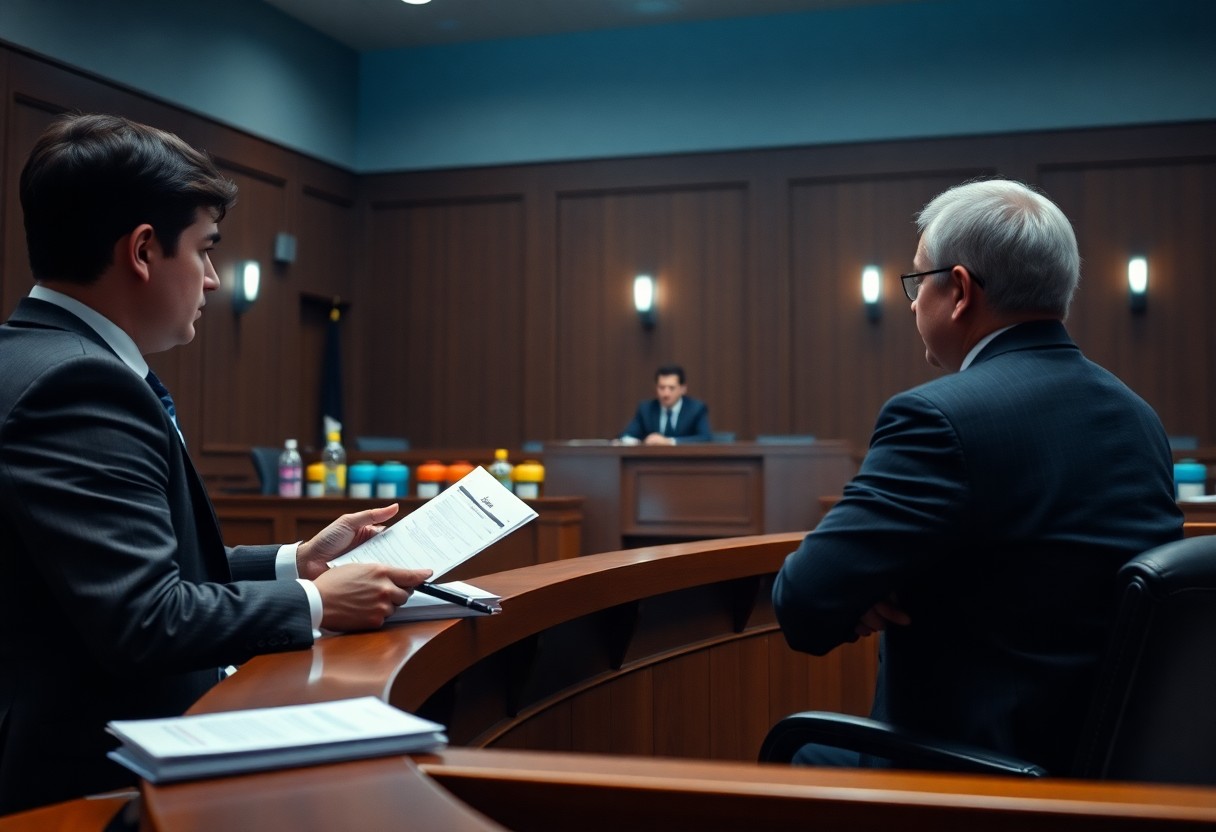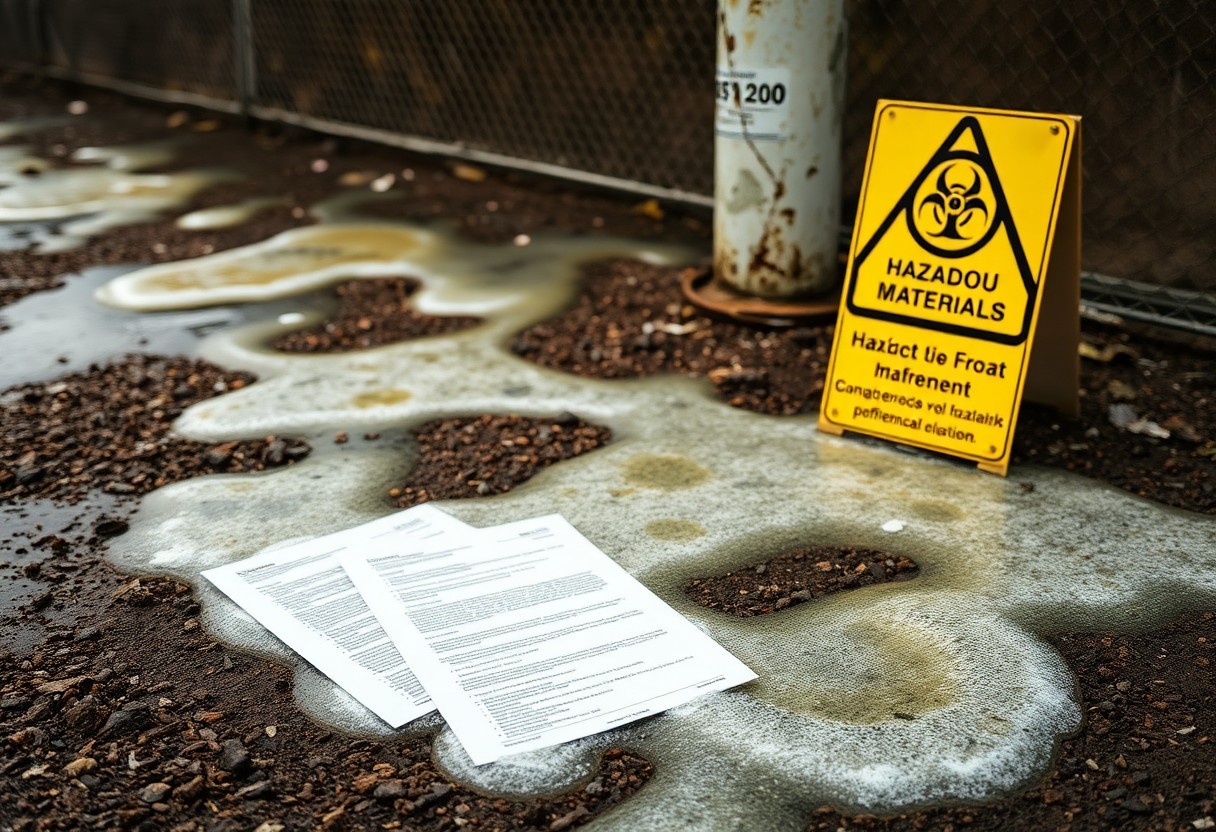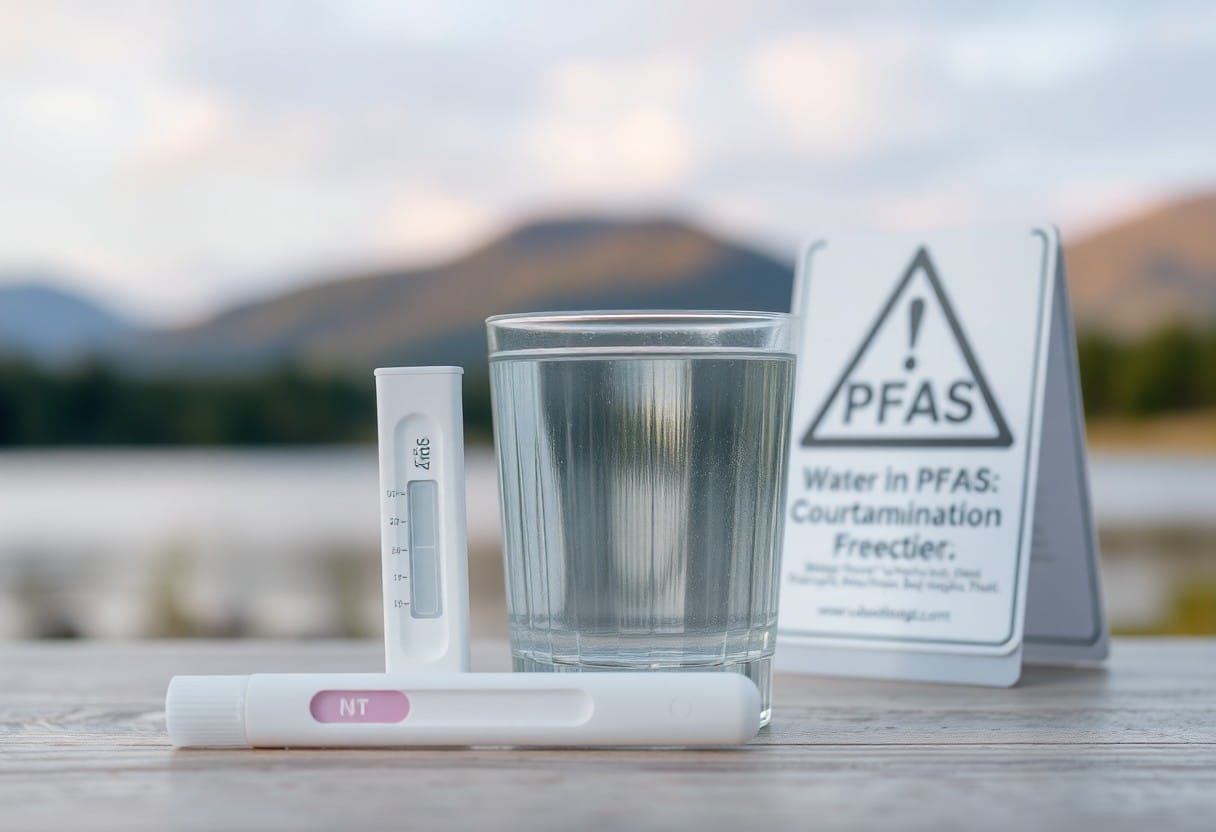Most individuals unaware of the dangers posed by AFFF (aqueous film-forming foam) face significant challenges when attempting to hold manufacturers accountable. You need to understand the key steps in building a strong legal case that demonstrates their responsibility for health risks. This guide, with insights from top attorneys, will equip you with imperative strategies and tips to effectively navigate the complexities of your case, ensuring your voice is heard and your rights are protected.
Understanding AFFF and Its Risks
Overview of AFFF (Aqueous Film-Forming Foam)
An Aqueous Film-Forming Foam (AFFF) is a fire suppression agent widely used in firefighting, particularly for flammable liquid fires. This specialized foam works by creating a blanket over the liquid surface, effectively smothering flames and preventing re-ignition. You might notice that AFFF is commonly deployed at airports, military installations, and industrial sites where flammable substances are present. While its efficacy in firefighting is recognized, your awareness of its composition and potential risks is necessary in understanding its implications.
Health and Environmental Concerns
Environmental impacts and health risks associated with AFFF can be significant, particularly due to its chemical composition. AFFF contains per- and polyfluoroalkyl substances (PFAS), which are known for their persistence in the environment and human body, leading to potential bioaccumulation. You should be aware that exposure to PFAS has been linked to various health issues, including adverse effects on the liver, immune system dysfunction, and developmental problems. It is vital to consider these implications when assessing the safety of AFFF use and advocating for necessary regulations.
Overview of the health and environmental concerns associated with AFFF indicates that the persistent nature of PFAS poses a hazardous risk not just to those who are directly exposed but also to entire ecosystems. You should be concerned about how these chemicals can leach into soil and groundwater, affecting drinking water supplies and wildlife. In addition to the long-term health implications, the increasing awareness of the toxicological effects of these substances is prompting legal actions against manufacturers. As you engage in building a strong case against AFFF manufacturers, understanding these intricate health and environmental details is paramount in positioning your argument effectively.
Identifying Key Legal Factors
It is necessary to understand the key legal factors when building a strong case against AFFF manufacturers. This involves examining various aspects that can significantly strengthen your argument. Below are some important elements you should consider:
- Negligence and its definitions
- Product liability laws
- Documented evidence of exposure
- Health impacts and scientific studies
- Regulatory compliance breaches
Thou must explore deep into these factors to create a compelling argument that holds water in legal discourse. By addressing these elements thoughtfully, you set a strong foundation for your case.
Establishing Negligence
Identifying negligence on the part of AFFF manufacturers requires a careful analysis of their actions and inactions. In legal terms, negligence involves failure to exercise the degree of care that a reasonable person would in similar circumstances. You will need to gather evidence showing that the manufacturer either developed a defective product or did not adequately warn users about the safe handling and potential health risks associated with AFFF. Documentation such as internal memos, industry standards, and scientific research can bolster your claims of negligence.
Establishing negligence also entails demonstrating a direct link between the manufacturer’s actions and your health complications caused by AFFF exposure. By doing so, you can illustrate that had the manufacturers acted responsibly, your damages could have been avoided. This evidentiary support is vital as you navigate your legal claim.
Understanding Product Liability
Identifying product liability involves showing that AFFF manufacturers are responsible for any harm their products cause. Product liability laws hold these companies accountable if their products are deemed defective in design, manufacturing, or marketing. You will need to understand the specific claims you can bring against these manufacturers, including design defects, manufacturing flaws, and failure to warn consumers of potential risks associated with their products.
Another important aspect of product liability to consider is the distinction between types of defects. In the case of AFFF, you might argue that the product was unreasonably dangerous due to its chemical composition or improper labeling. By highlighting the health risks linked to long-term exposure, you can make a compelling case that the manufacturers knowingly brought a hazardous product to market, which consequently affected your wellbeing. This line of argumentation enhances your position in seeking justice and compensation.
Gathering Evidence
There’s no doubt that the process of gathering evidence is a vital step in building a strong case against AFFF manufacturers. The success of your argument will largely depend on the quality and comprehensiveness of the evidence you collect. This is where you, as a claimant or attorney, need to be thorough and methodical. Start by considering the various types of evidence that can support your case.
Types of Evidence to Collect
The following table outlines the different types of evidence you should consider gathering:
| Type of Evidence | Description |
| Documentary Evidence | Records, emails, and documents demonstrating the use of AFFF and its impacts. |
| Medical Records | Health records showing harmful effects linked to AFFF exposure. |
| Witness Testimonies | Statements from individuals who can confirm use or effects of AFFF. |
| Expert Analyses | Reports from professionals testing the safety of AFFF. |
| Environmental Studies | Research showing environmental damage caused by AFFF. |
This comprehensive approach will ensure that you cover all necessary angles in your argument.
Importance of Expert Testimonies
Some might underestimate the weight of expert testimonies in a legal battle against AFFF manufacturers, but these voices can significantly bolster your case. Expert witnesses bring specialized knowledge and experience that can help clarify complex issues for the court. They can provide insights into the manufacturing processes of AFFF and its known health risks, thereby establishing a link between exposure and health-related claims.
For instance, by engaging environmental scientists or medical professionals who have studied PFAS exposure, you provide the jury with informed perspectives. These experts can explain the science behind toxic exposure and its consequences, effectively translating technical data into understandable terms for legal proceedings. Their testimonies can reinforce your argument by offering undeniable evidence of the dangers associated with AFFF. Thus, incorporating expert testimonies should be seen as a fundamental part of your strategy to hold AFFF manufacturers accountable.
Building Your Legal Strategy
Your journey to building a strong case against AFFF manufacturers starts with establishing a well-defined legal strategy. This means dissecting every aspect of your potential claim to ensure that all elements are thoughtfully crafted and presented. Taking the time to analyze the types of evidence you can gather, alongside your personal experiences and health implications, will set the foundation for your case. Consider reaching out to legal professionals who specialize in cases related to AFFF, as they can provide insights and direction tailored to your specific situation.
Choosing the Right Legal Representation
Any successful legal battle hinges on your choice of representation. As you search for the right attorney, prioritize those with a proven track record in exposure cases related to AFFF and who understand the underlying complexities of the chemicals involved. It’s important that your attorney not only has experience but also shares your commitment to pursuing justice for the harms caused by these manufacturers. A lawyer who specializes in environmental or toxic tort cases can provide valuable knowledge that is imperative in navigating your claim.
Developing a Compelling Argument
Clearly articulating your argument is a significant aspect of your legal strategy. To effectively persuade the court, you must frame your case around facts that expose the negligence of AFFF manufacturers. This involves gathering comprehensive data about the use of AFFF, the potential health risks, and the extent of the damage done. Documenting personal experiences and how they connect to the harmful effects of AFFF will enhance your narrative, making it relatable and impactful. By establishing a robust cause-and-effect relationship within your argument, you can strengthen your position and make it harder for the opposing side to refute.
Understanding the implications of the evidence you collect is imperative for developing a convincing argument. Each piece of information you gather should construct a narrative that ties back to the responsibility of AFFF manufacturers. As you connect the dots between their actions and your experiences or injuries, you reinforce your case’s integrity. Make sure to focus on illustrating the human impact of the chemicals involved, as well as the long-term health risks associated with exposure. A strong, fact-driven argument can not only support your claim but also resonate with those evaluating the case.
Tips for Effective Communication
For building a strong case against AFFF manufacturers, effective communication is vital. This involves not only clear interactions with your legal representation but also outreach to regulatory bodies. Here are some tips to guide your communication:
- Be concise and articulate your concerns clearly.
- Stay organized by maintaining records of all interactions.
- Use specific examples to illustrate the impact of AFFF on your health or environment.
- Be open to feedback and make adjustments as needed.
- Keep emotional responses in check to maintain a professional tone.
Recognizing the importance of effective communication can significantly shape the outcome of your case.
Communicating with Your Legal Team
Even the best attorneys require clear and consistent communication from you to effectively advocate for your case against AFFF manufacturers. Make sure to discuss all relevant facts and your personal experience related to AFFF exposure. Provide documentation, such as medical records or evidence of contamination, so that your attorney can thoroughly understand the scope of your situation.
Establishing a routine for regular updates can also be beneficial. Set up meetings or check-ins to discuss any new evidence or developments that may arise in your case. This ongoing dialogue will ensure that your legal team remains equipped to represent your interests throughout the legal process.
Engaging with Regulatory Bodies
Clearly articulating your experiences and concerns to regulatory bodies is imperative in holding AFFF manufacturers accountable. Engaging with these organizations can provide a platform for your voice to contribute to broader discussions on public health and safety. Prepare to share your story, emphasizing the specific risks associated with AFFF usage and its environmental impact.
With regulatory bodies, utilize opportunities to submit comments or appear at public hearings to express your views. Address how AFFF exposure has affected not just your health but also the health of your community. By highlighting the dangerous implications of these chemicals in your environment, you can foster awareness and drive regulatory changes. Collecting data and presenting it effectively can further strengthen your position, prompting these bodies to take necessary action against manufacturers. Recall, your contributions can lead to significant changes in public policy and help prevent further exposure for others.
Navigating the Legal Process
Despite the challenges that can arise in any legal situation, navigating the legal process for a case against AFFF manufacturers can be manageable with the right guidance. Engaging a skilled attorney can significantly streamline your experience, allowing you to focus on your health and wellbeing. If you’re considering a legal battle, visiting resources like Firefighting Foam Lawsuit: How Can An Attorney Help? can provide you with valuable insights into how an experienced lawyer can assist you throughout the claims process.
Steps in Filing a Claim
Any legal claim begins with gathering evidence related to your case. This might include medical records documenting your health issues linked to AFFF exposure, expert testimonies pinpointing causation, and documentation of your interactions with the manufacturers. After compiling this vital information, your attorney will assist you in drafting the necessary legal documents. They will also file your claim in the appropriate court, ensuring that all procedures are closely followed to avoid delays.
Timeline of a Typical Case
The duration of a typical case against AFFF manufacturers can vary significantly depending on several factors including the complexity of the case, the jurisdiction, and the parties involved. On average, from filing to resolution, the process may take anywhere from a few months to several years. Initially, you might see proceedings going through *discovery*, where both parties exchange information, followed by pre-trial motions that can prolong the entire process.
Navigating the timeline of your case requires understanding that some phases can be lengthy due to legal complexities. It’s common for extensive delays to occur during the discovery process and pre-trial motions. Additionally, should your case advance to trial, you may find that the timeline extends further, particularly if appeals are made. Ensuring you have a competent attorney by your side can aid in expediting aspects where possible and keeping you informed about what to expect at each step of the way.
Summing up
Now, as you navigate the complex process of building a strong case against AFFF manufacturers, it’s vital to arm yourself with the right knowledge and strategy. Start by gathering compelling evidence that supports your claims, whether it’s scientific research, medical records, or testimony from experts in the field. Document how exposure to AFFF has affected your health and gather insights into the environmental implications, as these factors will significantly bolster your argument. Collaborating with skilled attorneys who specialize in this area can enhance your case, as they can provide guidance tailored to your specific situation and help you navigate the legal landscape.
Additionally, it’s beneficial to stay informed about ongoing litigation trends and relevant regulations surrounding AFFF use. This knowledge empowers you to understand potential pitfalls and enhance your arguments effectively. Partnering with experienced professionals will not only streamline the legal process but also amplify your voice in holding manufacturers accountable. With thorough preparation and an unwavering focus, you can increase your chances of achieving a favorable outcome in your case against AFFF manufacturers.


















